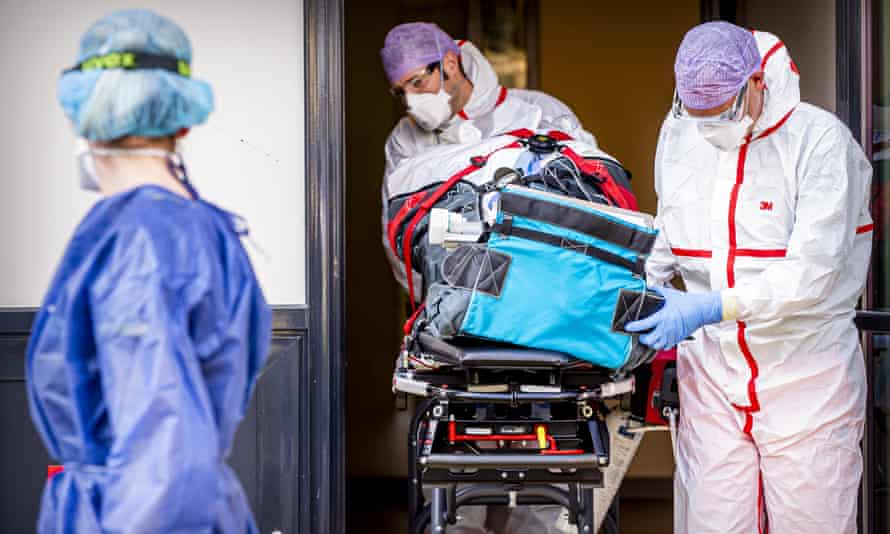Scrutiny of government procedures after ‘not-for-profit’ PPE contract led to ‘€20m enrichment’
 Medics in Amsterdam equipped with protective clothing last year. The investigative website Follow the Money looked at the financial reward gained by a former civil servant, Sywert van Lienden, and his partners, from a PPE deal with China. Photograph: Patrick van Katwijk/Getty Images
Medics in Amsterdam equipped with protective clothing last year. The investigative website Follow the Money looked at the financial reward gained by a former civil servant, Sywert van Lienden, and his partners, from a PPE deal with China. Photograph: Patrick van Katwijk/Getty Images
The Dutch government has promised an independent investigation into a supposedly not-for-profit €100m (£86m) deal to buy face masks from China last year that ended up making three young entrepreneurs about €20m richer.
The investigative website Follow the Money (FTM) revealed that Sywert van Lienden, 30, a former civil servant turned TV pundit and activist, who co-wrote the manifesto of the Christian Democrat (CDA) party (part of the ruling coalition), netted €9.2m.
His two associates, Bernd Damme and Camille van Gestel, made €5.7m and €5.5m respectively, after launching a not-for-profit foundation amid a barrage of publicity in April 2020, after hospitals and officials warned of a desperate shortage of PPE.
Barely two days after the launch of their Auxiliary Forces Alliance charity, however, the trio set up a limited company that was used to buy and import the 40m masks. They have confirmed the details of the scheme – and their profits – to FTM.
Van Lienden apologised for what he called an “inexplicable … lack of transparency and openness”, telling Dutch television this weekend he had been “completely destroyed and humiliated” and had “disappointed a lot of people”.
He insisted the deal was legal, but said he understood why health workers found it “incomprehensible such sums were made”. He also said he regretted waiting until last month, when the Volkskrant newspaper revealed details of the scheme, before “shouting from the rooftops that a private limited company was involved”.
Unlike van Gestel, who has said he will keep the his share of the profits, van Lienden said – “depending on the devastating consequences of this media storm” for his professional career – he hoped to donate much of his payment to charities funding youth cancer research and underprivileged children.
There is no evidence any Dutch politician profited personally from the deal, but a spotlight has been thrown on the government’s handling of the affair given van Lienden used his contacts in the Hague to advance and publicise the contract, approaching the health minister, Hugo de Jonge, and his assistant.
After insisting to MPs last week that it was “irrelevant” that a private company was involved because van Lienden had offered “good quality masks at a reasonable price” and that was all that mattered, the Dutch minister for medical care, Tamara van Ark, this week agreed to a independent investigation into the scandal.
Van Ark said it had only recently been brought to her attention that the health ministry had funded the deal upfront. “The most important thing was that we had the face masks,” she told Dutch television. “We did not have the luxury of choice.”
In the end, however, the masks sourced by the trio were not needed and are still in storage, with some reports questioning whether or not they met safety standards.
The scandal echoes other Covid-19 procurement scandals in Europe. In March it emerged that centre-right CDU politicians in the German states of Baden-Württemberg and Rhineland-Palatinate had earned six-figure commissions for brokering deals to procure face masks during last year’s first coronvirus wave.
Two and a half months after the latest Dutch elections, meanwhile, talks on forming a cabinet are proving difficult and the chief negotiator is expected to ask for more time to identify the parties willing to work together in a new coalition.
The liberal-conservative VVD party of the prime minister, Mark Rutte, and the CDA are happy to have one centre-left party in the new coalition but not two – and Labour (PvdA) and the Green-Left are insisting on being entering government together.
In addition, the progressive Democrats 66 party, which finished second behind the VVD, does not want to work with the third member of the current coalition, the socially conservative Christian Union.
Post Views: 1,390

